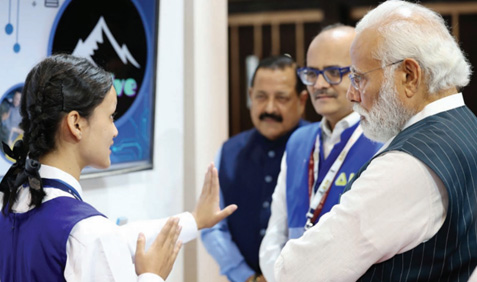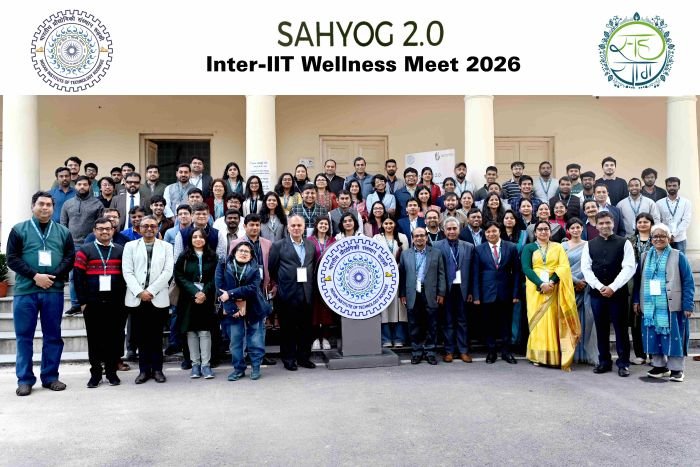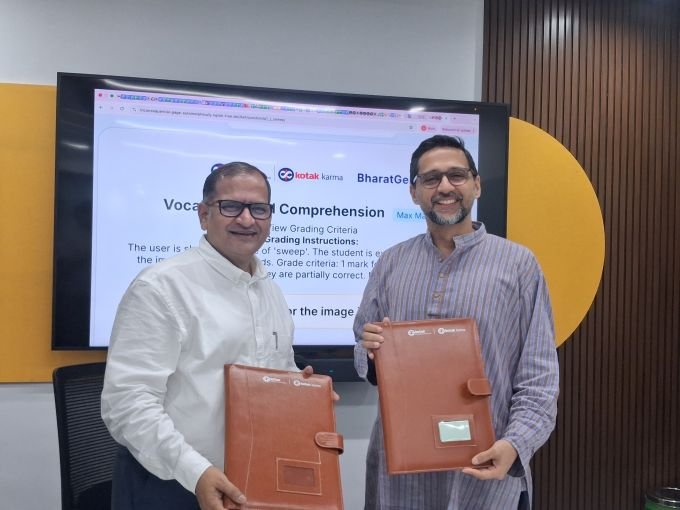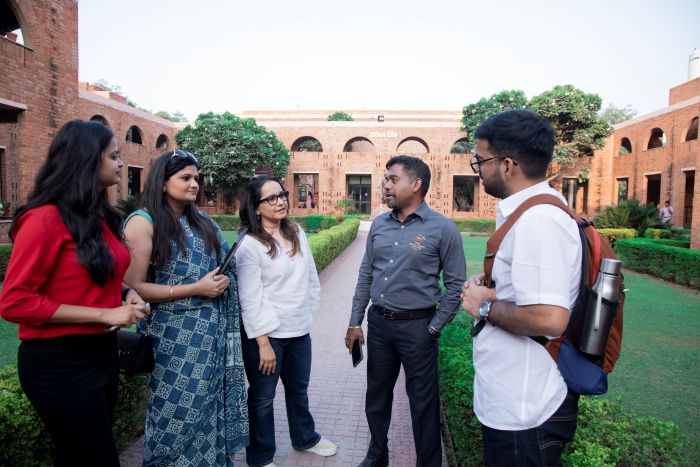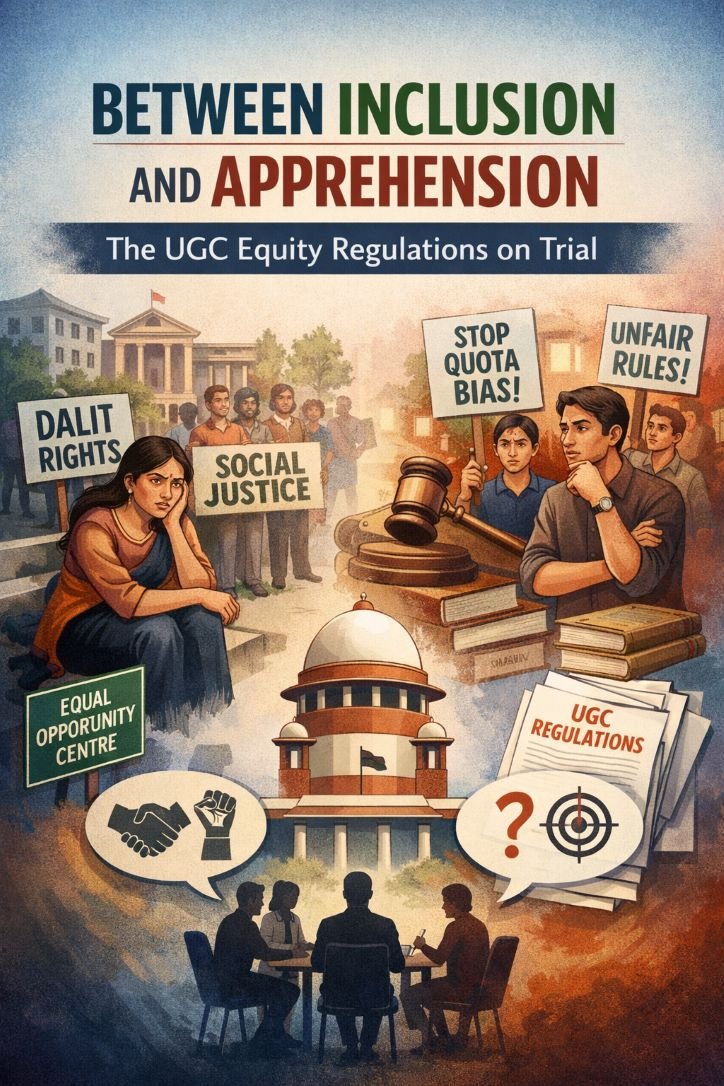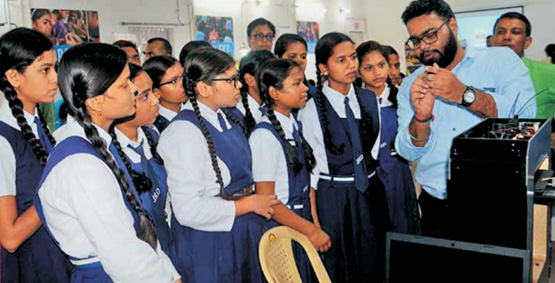
Designed to instill a culture of tinkering, innovation and hands-on learning, these labs are fostering a generation of problem-solvers and innovators equipped with 21st-century skills. To date, AIM has established 10,000 ATLs, covering more than 90% of all districts across India. This inclusive approach bridges the rural-urban and government-private divide, providing equal opportunities to students irrespective of their backgrounds says Suman Pandit
Atal Tinkering Labs (ATL), the flagship initiative of the Atal Innovation Mission (AIM), NITI Aayog, Government of India, has emerged as a transformative force in nurturing innovation and creativity among high school students across India.
ATL is a state-of-the-art space established in schools for students between grades 6th to 12th. These labs are equipped with advanced tools and technologies such as the Internet of Things (IoT), 3D printing, robotics, miniaturized electronics, and do-it-yourself kits. The goal is to foster curiosity, creativity, and innovation, transforming how students think and approach real-world problems.
To achieve this, ATLs host activities ranging from competitions, exhibitions, and workshops on problem-solving to lectures on design and fabrication. These initiatives extend beyond students, offering parents, mentors, and community members a platform to bring their ideas to life, creating a collaborative environment for innovation.
Major Objectives of Atal Tinkering Labs
- Innovation Workspaces: Provide young minds with workspaces to experiment, innovate, and learn hands-on in a flexible environment.
- 21st-Century Skills: Empower youth with skills like creativity, critical thinking, ethical leadership, and design thinking.
- Solutions for India: Develop innovative solutions for India’s unique challenges, supporting its growth as a knowledge economy.
Stakeholders of the ATL Ecosystem
A robust ecosystem is crucial for ATL’s success. The ATL ecosystem is built on meaningful collaboration between diverse stakeholders, including – Central ministries/departments, State education departments, industry partners, higher education institutes, and mentors. These stakeholders bring technical expertise, domain knowledge, and resources to support the effective implementation of ATLs. Through structured partnerships, hands-on mentorship, and cross-sectoral collaborations, AIM creates opportunities for ATL schools to become centres of innovation. Here’s a detailed look at each stakeholder’s role:
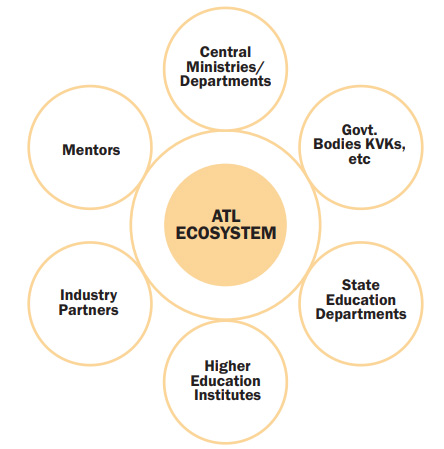
1. State & District Nodal Officers
The ATL initiative exemplifies the spirit of cooperative federalism by fostering collaboration between the central government and states. To ensure the effective implementation of ATL initiatives, State Nodal Officers (SNOs) and District Nodal Officers (DNOs) for school innovation initiatives have been nominated across all States/UTs. These officers play a pivotal role in driving operational excellence, and enhancing monitoring and evaluation mechanisms in ATLs. Additional responsibilities towards the ATL initiative include- saturating compliance parameters, organising district and state-level hackathons, and ensuring uniform access to resources and opportunities.
To build capacity among state officials, a comprehensive two-day orientation program for SNOs was conducted in New Delhi, in collaboration with the Ministry of Education and AICTE. Following this, a combination of offline and virtual orientation sessions for DNOs was conducted, equipping them with the necessary knowledge and tools to support ATL initiatives effectively. To further operationalize this framework, an engagement plan has been provided to SNOs and DNOs to actively monitor and support ATLs through regular visits, capacity-building initiatives for ATL in-charges, and adopting a cluster-based approach under ATL Sarthi.
2. State-Level Hackathons
AIM has been at the forefront of organising hackathons, creating environments where students can transform their ideas into impactful solutions. To create a more vibrant innovation ecosystem at the state level, AIM collaborates with the State education department and other institutions in the state (including ATL schools) to organize state-level hackathons. These hackathons underscore the importance of aligning innovation with local needs, allowing students to create solutions that directly benefit their communities. Two examples of state-level hackathons are- Tinkerathon in Chhattisgarh and InnovaTN in Tamil Nadu.
- Tinkerathon, Chhattisgarh: Supported by local government bodies, this hackathon witnessed over 216 teams addressing themes like Space Technology and Urban Development. ATL Talks, modelled on TED Talks, provided additional inspiration.
- InnovaTN, Tamil Nadu: Bringing together 517 teams, this hackathon aligned with the United Nations Sustainable Development Goals (UNSDG). The top 20 teams are now part of the Student Innovator Program (SIP), highlighting the event’s transformative potential.
3. ATL Corporate and Academic Partnerships
Corporate and academic partnerships play a vital role in fortifying the ATL ecosystem. These collaborations bring resources, expertise, and mentorship, enhancing the labs’ inclusivity and impact.
- ATL Adoption: Corporate partners adopt ATLs, focusing on underrepresented regions. For instance, Dell Technologies, in collaboration with the Learning Links Foundation, has supported over 300 ATLs. Their ShePreneur program focuses on empowering girl innovators. Other Adoption partners include organisations like Bayer, Capgemini, IndusInd bank and many others.
- Capacity Building: Partners like IBM have designed training programs such as Unbox Tinkering to enhance teachers’ STEM skills, benefiting over 13,000 teachers and thousands of students.
- Industrial Exposure: Partners provide real-world learning opportunities, including visits to factories, labs, manufacturing facilities, and R&D centres, bridging the gap between theory and practice.
4. Collaborations with Government Institutions
- Higher Education Institutions: The partnership with AICTE’s Innovation Cell connects ATLs with Institution’s Innovation Councils (IICs) to foster innovation across age groups. Activities include mentoring, joint projects, and stakeholder visits.
- Collaboration with Krishi Vigyan Kendras: AIM’s collaboration with Krishi Vigyan Kendras (KVKs) under the Ministry of Agriculture and Farmers Welfare (MoAFW) links ATLs with agricultural institutes and their scientists. Students visit KVKs, learning about technological advancements to address farming challenges and build projects to solve them.
5. Mentor India Program
The Mentor India program is a voluntary national movement being led by AIM, wherein skilled professionals provide pro-bono mentoring to young ATL innovators, with a strong sentiment towards nation building. These skilled volunteers, who are called the ‘Mentors of Change’, spend time on-ground with ATL students to enable them to experience, learn and practice innovation and 21st-century skills. There are currently 6200+ Mentors of Change from various organisations and academic institutions across India. Most Mentors dedicate 1-2 hours weekly, guiding students in innovation projects, organizing STEM activities, and ensuring active participation in competitions.
